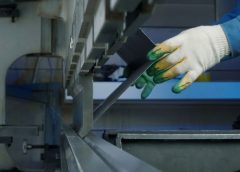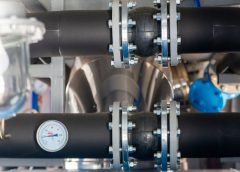The importance of precision in metal fabrication appears in very practical ways. Either a metal part fits where it is supposed to go and functions as it should, or it doesn’t. Sometimes that precision can mean the difference between safe or unsafe medical devices, structural integrity or weakness in steel beams, or functional or buggy electronics.
In metal fabrication, every cut, bend, and weld matters. A slight deviation can result in a significant impact on the final product’s performance and safety. Learn more about how precision plays a crucial role in metal fabrication.
Strength and Structural Integrity in Construction
Precision in metal fabrication is vital for ensuring the strength and structural integrity of steel beams and other metal components of buildings and infrastructure. Without precision, a beam may not fit together exactly with another, or metal wall studs may come out of a press brake bent due to crowning (the curvature that occurs in the bed and ram of a press brake during bending). If defects like these are present, they could lead to shoddy or even dangerous construction.
Functionality and Safety in Automotive and Aerospace Industries
In the automotive and aerospace industries, every component, from the smallest screw to the largest panel, needs to meet the highest accuracy standards. Any discrepancy can lead to malfunctions, which can potentially risk human lives.
For example, the precise shaping of metal parts in an engine ensures optimal performance and fuel efficiency. Similarly, the accurate fabrication of a plane’s wing or body can directly influence its aerodynamics and, consequently, its flight safety.
Consistency and Exactitude in Medical and Electronics Manufacturing
In the medical and electronics manufacturing sectors, consistency and exactitude are paramount. Medical manufacturers must fabricate surgical instruments, implants, and medical devices with precise tolerances to ensure their safe and effective use.
Similarly, in electronics manufacturing, the miniaturization trend demands extreme precision in fabricating circuit boards and other components. Any error can lead to device failure or performance issues.
Precision Reduces Waste
Precision significantly minimizes waste in metal fabrication. Precise measurements and accurate cutting ensure that people optimally use every piece of metal functions, leaving minimal scrap.
Plus, when parts fabrication is accurate the first time, there’s no need for rework or replacement, which would otherwise consume additional materials. That’s another way that precision in metal fabrication is important. It not only reduces material waste but also contributes to cost savings and environmental sustainability.
Precision in metal fabrication underpins functionality and safety in many industries. Maintaining precision in metal fabrication processes is not just important—it’s essential.





